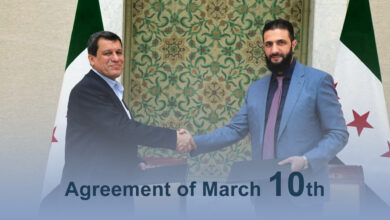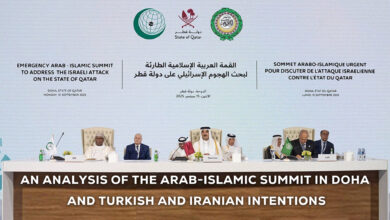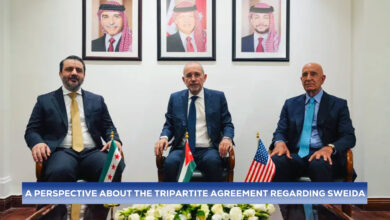US strikes against the Houthis… and developments in the Iranian nuclear file
Dr. Ahmed Sino
The article expresses the writer opinion
The Middle East witnessed great tension between Israel and Iranian arms in Lebanon and Gaza. America was behind the Israeli strikes on Hezbollah and Hamas, while Iran was the supporter of both. The Israeli attacks even extended inside Iran itself. Ismail Haniyeh was killed at his residence in Tehran during the last period of Biden’s term. On the other hand, Israel was able to eliminate Hassan Nasrallah and some leaders with him through an operation that resulted in the weakening of Hezbollah’s military capabilities and its field and military retreat. The Israeli attacks on Gaza also resulted in its near-total destruction in search of civilian hostages. These attacks resulted in the killing of Yahya Sinwar. Israeli operations are still ongoing despite the elimination of most of Hamas’s military capabilities and the massive destruction that befell the Gaza Strip. Israel is still searching for hostages, announcing that its military operations will not stop until the last of its hostages is found with Hamas. It can be said that the Israeli attacks have intensified more than before, especially during the term of the current US President, Donald Trump, as these attacks culminated in the elimination of the Syrian military force and led to the fall of Bashar al-Assad regime. Consequently, the influence of Iran and its factions in Syria was eliminated, particularly along the land supply route from the Syrian city of Al-Bukamal through the Syrian Badia to Lebanon, which supplied Hezbollah with weapons and missiles. Russian influence was also eliminated, and Russia retreated to its Hmeimim base on the Syrian coast.
Iran can no longer hide its arms or deny its other arms represented by the Houthi militias in Yemen, which are still controlled by the Yemeni people, especially in Sana’a, Saada and AL-Hudaydah, from which Iranian missiles are launched, threatening navigation in the Red Sea, the Suez Canal, the Bab al-Mandab Strait, the Arabian Sea and the Indian Ocean. Despite the British and Israeli attacks on Hudaydah, However Houthi strikes still pose a major threat to American, British, European, and international vessels, and threaten international shipping and trade routes for all countries of the world, with Iranian support. This is the same claim the Houthis use to justify their strikes against Israel. Recent weeks have witnessed more severe US strikes than previous strikes under Trump’s administration, as part of a broader strategy against Iran to undermine its influence in the region and reduce the scale and impact of Houthi strikes on international maritime trade in the Red Sea. The United States also seeks to downplay the role of Iranian-backed armed groups, as is the case with the Popular Mobilization Forces (PMF) in Iraq, and to reduce Iranian influence in Iraq. The PMF is making every effort to avoid US strikes or to restrict its unconstitutional and illegitimate status in Iraq. It appears that Iranian insinuations and the US message have reached the Iraqis and the Iraqi government, so they are trying to legitimize the Shiite and factional forces and place them within a legal and constitutional context with the Coordination Framework bloc in Iraq.
Returning to the American strikes against the Houthis, these strikes targeted Houthi groups in Sana’a, Saada, Zumar and elsewhere targeting Houthi missiles, Houthi command headquarters, and weapons depots. These strikes put significant pressure on the Houthis and Iran, facilitating the role and operation of maritime navigation in the international waterways in the Red Sea, which were previously mentioned. It seems that one of America’s strategic goals is to give strength and momentum to Israel to play a new role in the Middle East, as well as to push Turkey to reach an understanding with Israel in the region, especially in Syria and Iraq, as well as led Turkey to reach an understanding regarding the Kurdish national forces allied with the international coalition forces in Syria and Iraq, especially since Israel has been continuously striking weapons depots and airports in Syria, and preventing Turkey from establishing any bases in central Syria. It is not unlikely that an understanding will be reached between the two regional states to divide areas of influence between the Turkish and Israeli sides, and Israel may try to play the Kurdish and Druze cards in the internal situation in Syria. In an attempt to pressure the new Damascus government, headed by al-Sharaa, to move towards concluding agreements with Israel.
In the domestic Syrian context, the United States plays a pivotal role, along with the international coalition forces, Britain and France, in the issue of Kurdish-Kurdish rapprochement. It has brought the two sides closer to Kurdish unity to form the negotiating delegation with the new Damascus government.
Perhaps the strategic American policies of eliminating areas of tension and international crises, such as Ukraine, Gaza, and others, have led it, through the use of force or maximum pressure, to push them into peace negotiations and end the dispute and international crisis. Perhaps this is what it is following with Iran to push it to negotiate on the Iranian nuclear file, noting that Trump himself withdrew from negotiations with Iran on the nuclear file in 2018, and this approach seems to be followed with Iran. Indeed, Iran sat down to negotiate indirectly a few days ago in the Sultanate of Oman with the Americans, and these negotiations were described as positive, and they are to be resumed in a few days in Rome at the Omani embassy, and this is what we will follow later.
However, America will not tolerate Houthi threats to its interests especially those threatening American ships and aircraft, because America has suffered significant losses in its ships and trade. American container shipping operations through the Red Sea have declined, which witnessed the passage of about 25,000 ships before the Houthi attacks. This number has now decreased to about 10,000 ships, and American goods have included cars, agricultural exports, and shipping containers. This has caused significant damage to the international coalition forces in maritime navigation and trade through the Red Sea. Despite the attempts of many international parties to provide security protection for their trade and ships, it seems that this has not yielded results. Despite this, the Houthi attacks have not stopped for more than two years, and the number of their attacks against American warships has reached 174 attacks, and against commercial ships 145 attacks, under the pretext of solidarity with the Palestinians in their war against Israel. The American strikes against the Houthis also send a message that Iran may be the target, especially since America is the only one capable of penetrating the depth of the Iranian nuclear file factories and plants, due to the United States’ possession of huge penetrating bombs that reach great depths of the earth’s layers, as happened with the assassination of Hassan Nasrallah.
America currently wants to slow down the Iranian nuclear program and weaken its negotiating position, whether in Oman/Muscat or in Rome at the Omani embassy. Iranian maneuvers have already begun through its official and unofficial statements that it has no relationship with the Houthis, and that the Houthis are independent in their political and military decisions. Consequently, Iran has begun to disavow its Houthi arm under the pressure of the strong American attacks called maximum pressure. Therefore, it is trying to avoid repeating the same scenario with itself in Iraq with the (PMF) and its factions in the coming days. Therefore, it is working to legitimize the PMF and place them within a legal and constitutional context, as we mentioned previously.
The United States could achieve significant economic and strategic gains from key regional states in Iran’s neighborhood, such as the Gulf states and Gulf Cooperation Council (GCC) states, particularly Saudi Arabia, the UAE, Qatar and Kuwait. This would send a message to Iran and the Gulf states that they must remove any future obstacles in the Gulf waters and the Strait of Hormuz. This would also lead to absolute American hegemony over maritime navigation routes in the Red Sea, the Gulf, and the Indian Ocean, including their waterways, straits, and gulfs. This would push all countries in the region under the American umbrella for security and intelligence cooperation. This would facilitate Israel’s plans to implement the Abraham Accords and normalize relations with Israel, especially with countries that have not yet entered into an agreement with Israel, such as Saudi Arabia and Syria, which are on the path to economic and strategic normalization.
However, the US strikes against the Houthis will affect the region’s political balance and push everyone to rearrange their political cards, especially Iran and Turkey. Internal political alliances may change in Iran, Turkey, Syria, and Iraq, as the Syrian situation is still in case of labor, The government is an interim government, and the constitutional declaration was distorted, as there is no real constitution that represents all components of the Kurds, Alawites, Druze, and Syriacs. A single language is still imposed on everyone, and a single religion and Islamic jurisprudence remain the source of legislation and the constitution. The economic situation remains shaky and unstable, and all components of people in Syria are still in a state of anticipation, waiting, and rejection. Some are demanding to join the Democratic Autonomous Administration in North and East Syria, amid persistent efforts by the Syrian Democratic Forces to work to consolidate stability and improve the economic situation for all Syrians. We will continue to await the outcome of the situation in the coming days.




